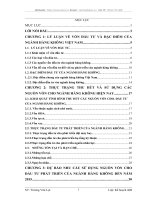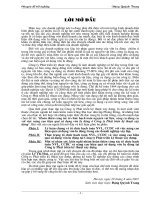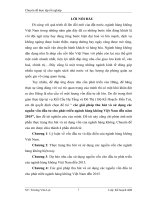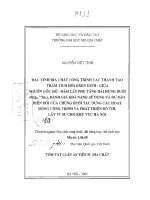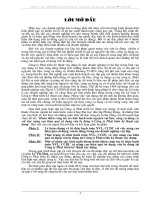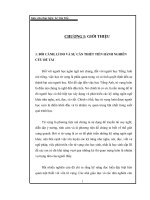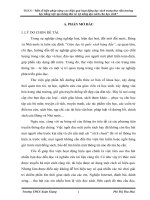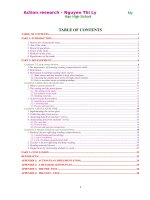skkn hiệu quả của việc sử dụng các câu chuyện ngắn nhằm giúp phát triển kỹ năng đọc hiểu của học sinh
Bạn đang xem bản rút gọn của tài liệu. Xem và tải ngay bản đầy đủ của tài liệu tại đây (268.15 KB, 36 trang )
Action research – Nguyen Thi Ly
My Hao High School
Table of contents
TABLE OF CONTENTS...................................................................................................................................................1
PART 1: INTRODUCTION..............................................................................................................................................2
1. Reason for choosing the topic.
.................................................................................................................2
1.2 AIMS OF THE STUDY ............................................................................................................................................3
2. Aim of the study ................................................................................................................................................4
3. Research questions...........................................................................................................................................4
4. Scope of the study.............................................................................................................................................4
5. Methods of the study.........................................................................................................................................5
6. Significance of the study...................................................................................................................................5
PART 2: DEVELOPMENT...............................................................................................................................................6
CHAPTER 1: LITERATURE REVIEW..............................................................................................................................6
1.The importance of learning reading comprehension skills...............................................................................6
2. Motivation.........................................................................................................................................................6
3. Motivation in leaning reading short stories. ...................................................................................................7
3.1. Short stories and their benefits to high school students..................................................................................................7
3.2. Choosing the suitable short stories for high school students..........................................................................................8
3.3. How to use short stories in teaching reading..................................................................................................................9
CHAPTER 2: RESEARCH METHODOLOGY..................................................................................................................11
1. What is action research?................................................................................................................................11
2. The setting and the participants .....................................................................................................................11
2.1. The setting of the study..................................................................................................................................................11
2.2 The subjects of the study................................................................................................................................................11
2.3. Reading materials...........................................................................................................................................................12
3. Action research procedure
..........................................................................................................................12
3.1. Identifying a problem.....................................................................................................................................................12
3.2. Collecting data.............................................................................................................................................................12
3.3. Pre-test and post-test......................................................................................................................................................13
CHAPTER 3: DATA ANALYSIS..............................................................................................................................14
1. Implementing the action plan.........................................................................................................................14
2. Collecting data from survey............................................................................................................................14
3. Analyzing data from teachers’ survey............................................................................................................15
4. Analyzing data from students’ survey.............................................................................................................15
4.1. Pre -test data...................................................................................................................................................................15
4.2. Post test data..................................................................................................................................................................16
4.3. Pre-test and post-test comparison........................................................................................................................17
CHAPTER 4: MAJOR FINDINGS AND SUGGESTIONS...................................................................................................18
1. Students' factors affecting reading comprehension........................................................................................18
1.1. Limited background knowledge....................................................................................................................................18
1.2. Lack of vocabulary........................................................................................................................................................18
1.3. Lack of reading comprehension skill............................................................................................................................19
2. Teacher’s factors affecting teaching reading.................................................................................................20
3. Reading material factors ...............................................................................................................................20
4. Suggestions for motivating students to read...................................................................................................21
PART 3. CONCLUSION.................................................................................................................................................22
APPENDIX 1:
ACTION PLAN IMPLEMENTATION........................................................................................25
OF USING SHORT STORY-READING ACTIVITIES............................................................................................25
..........................................................................................................................................................................25
APPENDIX 2:
A DETAILED LESSON PLAN...................................................................................................26
APPENDIX 3: THE PRE - TEST..................................................................................................................................26
APPENDIX 4: THE POST - TEST................................................................................................................................28
1
Action research – Nguyen Thi Ly
My Hao High School
Part 1: Introduction
1. Reason for choosing the topic.
It is assumed that the more students read, the better readers they become.
Therefore, establishing students’ habits of reading is very necessary, especially in
second language learning.
Being aware of the importance of learning reading skill, authors of new English
10 have chosen interesting topics for reading lessons with the aim to promote
students in reading and improve their reading comprehension. However some of them
are not familiar with students' genre and reading in the text book only is not enough
to enhance students' interest in reading and reading comprehension. Thonis, (1970)
suggested:
Comprehension skills depend upon two major factors: the background of
experiences, from which concepts have been acquired, and the speed, accuracy,
and richness of meanings which students bring to word recognition. The
advancement of skill in understanding what is read receives major emphasis
during the intermediate and high school years. As students become more
efficient readers, the written language which they meet in books becomes a
source for larger vocabularies, for increased knowledge, and for deeper
comprehension of themselves and the world around them.
Thus beside the reading texts in the text book students need to read more outside
class room to enrich their vocabulary as well as their background knowledge. That
means students must read extensively.
So many studies and researches have been conducted to find out ways to
improve reading effectiveness. Recently, there have been a lot of researches about the
effect of extensive reading in improving students’ reading comprehension. Colin
Davis (1995:335) suggested that any classroom will be the poorer for the lack of an
extensive reading program and will be “unable to promote its students’ language
development in all aspects as effectively as if such a program were present”. He also
claimed that such a program will make students more positive about reading, improve
their overall comprehension skills, and give them a wider passive and active
vocabulary. Myuskens (1983) affirmed that "with students at the beginning and
intermediate levels, instructors can use literacy text for language practice, reading
comprehension and possible aesthetic appreciation”. Strong (1996) also stated that
2
Action research – Nguyen Thi Ly
My Hao High School
“extensive reading of literature can encourage students to develop positive attitudes
toward reading”.
However, At My Hao high school, the teaching and learning reading are mostly
based on text book. Therefore, the students seem not to be interested in reading
lessons. Most of them feel reading is difficult and boring even they are afraid of
reading. Thus, after reading a text they often don’t understand much about its content
or they misunderstand author’s ideas. When studying in a reading lesson, students
often experience the lack of background knowledge as well as vocabulary about the
topics they are reading. Other important reasons are their lack of motivation and time.
In the word of foreign language, the most popular expression might be “practice
makes perfect”. That is the reason why the teachers have to find ways to enhance
students read more and to improve their reading comprehension.
From the point of view: students only read what they are interested in, the
researcher come to the study of using short story in teaching reading. Because among
literature materials, short story seems to be the most suitable with high school
students of all. Students at this age are curious and they like reading short stories.
Collie and Slater (1991: 196) list the advantages of using short stories for language
teachers: short stories are practical as their length is long enough to cover entirely in
one or two class sessions; they are not complicated for students to work with on their
own; they have a variety of choice for different interests and tastes; and they can be
used with all levels (beginner to advanced), all ages (young learners to adults) and all
classes (summer courses to evening classes). Moreover short stories don’t take much
time. Students can read them at the break, before going to bed, on the bus or when
they are waiting for someone.
With the above reasons I decided to do an action reaseach on using short stories
as a sort of extra reading materials with the aim to motivate students in reading and
improving their reading ability.
1.2 Aims of the study
The study is to find down if the using short stories in teaching reading helps
motivate students at My Hao high school in reading and improving their reading
ability.
The overall purpose of the study is to investigate the effectiveness of the using
short story reading activities (as extra reading activities) at My Hao high school. Thus
3
Action research – Nguyen Thi Ly
My Hao High School
survey questionnaires and class observations are used to investigate the teachers and
the students' attitude towards the using short stories in teaching and learning reading
as well as to examine the students' preferences for students' reading activities applied
by the researcher.
The results of the study show that both teachers and students are fully aware of
the sheer importance of short story reading activities to the students' comprehension.
Among them, summarizing the story in spoken or written form appears to be the most
interesting activities. After this activity, the students not only comprehend deeply the
short story but they also practice speaking and writing skills. Secondly, the students
find it easier to comprehend the story by filling in relating problems or themes in the
story to their real life.
2. Aim of the study
The study is to find down if the using short stories in teaching reading helps
motivate students at My Hao high school in reading and improving their reading
abilities.
3. Research questions
This action research aims at answering the following research questions:
1. What are the students' problems and causes of the problems in reading lessons?
2. What are students' attitude and preferences for the using short stories in teaching
reading?
a. How do they find the short story reading activities that teacher applied?
b. What benefits do they think the short story reading activities bring them?
c. What short story reading activities do they like most to comprehend the
story more effectively?
3. Does the using short stories in teaching reading help students improve their
reading comprehension?
4. Scope of the study
The research aims at applying the using short stories in teaching reading to
grade 10 students at My Hao high school. The subjects of the study are 50 students of
class 10A3 (school year: 2011-2012) at My Hao high school including 22 males and
28 females. The age of those 50 students ranges from 16 to 17. Hopefully, the
findings of the study may be applied in teaching reading to students at My Hao high
school and other high schools in Vietnam.
4
Action research – Nguyen Thi Ly
My Hao High School
5. Methods of the study
• Methodology:
I designed this action research since it is the problem in my own class and I
would like to improve my students' reading skill. It is a practical action because its
purpose is to research a specific school situation with a view toward improving
practice reading, to focus on a small-scale research project, to focus narrowly on a
specific problem and to be undertaken by an individual teacher within a high school.
• Data collection instruments:
To answer the research questions of the study, the data are collected through
questionnaires, interviews, observations, and tests.
6. Significance of the study
As mentioned above, learning reading is very important to students. Therefore,
to raise students’ interest in reading and help them comprehend the text better, the
applying extra reading activities in teaching reading are very necessary.
The aim of this study is to find out whether the using short stories in teaching
reading motivates students in reading and improves their reading comprehension.
5
Action research – Nguyen Thi Ly
My Hao High School
PART 2: development
Chapter 1: Literature review
1.The importance of learning reading comprehension skills
Reading comprehension is what allows the readers to interact with the text in a
meaningful way. It’s the bridge from passive reading to active reading, from letters
and words to characters and contexts. Reading comprehension is the crucial link to
effective reading - a strong factor in our educational and professional lives. For many
reasons, reading comprehension also unlocks the door to a lifetime of reading
recreation and enjoyment. Reading comprehension skills increase the pleasure and
effectiveness of reading. In short, building reading comprehension skills require a
long term strategy in which all the reading skill areas (phonics, fluency, and
vocabulary) will contribute to success. Thus, teachers should find out what skill areas
that their students are bad at and help them improve those ones.
2. Motivation
If students are going to develop good reading skills, they’ll want to read.
People are more motivated to read if they are interested in the topic. Research
confirms that students' motivation is a key factor in successful reading. Harmer, J
(2003;44) defined "motivation is some kind of internal drive that encourages
somebody to pursue a course of action."
Students' interest in reading is vital to the motivation and reading
assignment (Collins, Decker, 1996.53). If a student is intrinsically motivated, the
students desire to read the materials because they are interested in it. Another strategy
that is used to promote intrinsic motivation is to find topics that students are
interested in learning more about and have the students research it (Guthrie,
Solomon, 1997;43). The students want to read the material because they are so
determined to learn more about the subject; they will also want to work hard at it
because they picked it out (Hunt, Lyman, 1997;21).
Beside intrinsic motivation, extrinsic motivation is not less important. In this
study, extrinsic motivation is considered as teacher's role in enhancing students to
read as well as sustaining students' interest in reading. Harmer (2003) said that
"clearly a major factor in the continuance of a student's motivation is the teacher."
The teachers are the people who know best about their students, they will know how
6
Action research – Nguyen Thi Ly
My Hao High School
to enhance their students' interest in reading and when to provide help to them. The
teachers are also students' friends who share their difficulties in learning and from
those difficulties they will find the most suitable method of teaching to increase and
direct their students' motivation.
Thus, to make our students want to read, besides giving them interesting
lessons with pleasant learning environment and various activities we need to provide
them materials that they are interested in or let them choose their own materials to
read.
3. Motivation in leaning reading short stories.
3.1. Short stories and their benefits to high school students
When students are let to read materials that they are interested in they will want
to read more. Wells. C (1980;78) stated that “If reading has been pleasurable because
the students have been able to identify successfully (emotionally and intellectually)
with the text, and to organize the material, then the students will want to read more.
This desire will set off a chain reaction which will lead to more reading, and the more
the student reads, the better he will read.”
To high school students, short stories seem to be the most suitable materials for
extra reading activities. Erkaya (2005;75) said "short stories usually have a
beginning, middle and an end, they encourage students at all levels of language
proficiency to continue reading them until the end to find out how the conflicts is
resolved”. He also stated that " short stories, for example, help students to learn the
four skills listening, speaking, reading, writing more effectively because of the
motivational benefit embedded in the stories and with short stories, instructors can
teach literacy, culture, and higher-order thinking benefit." Accordingly, what Hirvela
and Boyle (1988;66) report is not surprising: they examine students' attitudes towards
four genres of literary texts (short stories, novels, poetries and dramas) and state that
their Hong Kong Chinese students indicated short stories as the genre that is less
feared and the second most enjoyed (43%; the novel is the most enjoyed with 44%),
since short stories are easy to finish and definite to understand.
In addition, short stories are the best path to improve your overall reading
comprehension. Short stories are easy, not time consuming, and the plots are
relatively simple, with limited locations and characters. In about an hour or so, you
should be able to read a short story, and then sit down and analyze the story from
beginning to end. You should be able to identify the characters, what the story’s plot
is about, and analyze the plot from different angles. This will teach you to see a
system from different angles. “Thus short stories - they are simply, easy and fun. But
they can really improve your reading comprehension”(Keith Johnson, 2008;77).
7
Action research – Nguyen Thi Ly
My Hao High School
In conclusion, the answer to the question of why short stories are the most
suitable literary form to use in English classes lines in Edgar Allan Poe's definition of
short stories. He defined it "as a narrative that can be read at one sitting of from onehalf hour to two hours, and that is limited to 'a certain unique or single effect', to
which every detail is subordinate" (Abrams, 1970;88). Since it is short, and aims at
giving a single effect, there is usually one plot, a few characters; there is no detailed
description of setting. So, it is easy for the students to follow the story line of the
work.
3.2. Choosing the suitable short stories for high school students.
As it is mentioned above, of literacy genres, short stories seem to be the most
suitable one to use in crowded class due to its shortness. However, there is no strict
rule to determine the length of short stories; as well as very short stories, there are
longer ones. Therefore, it is the duty of the teacher to choose a story short enough to
handle with course hours. "The shortness of the text is important for the students
because they will see that they can read, understand and finish something in English,
and it will give the students a feeling of achievement and self - confidence" (Zerrin
Eren, 2004.98) To high school students with the pre-intermediate language level the
teacher can choose short stories which have from two hundreds words to three
hundred words in length.
Beside the length of the work, there are some other important criteria that must
be considered while choosing the text. Hill (1994;45) points out the basic criteria to
be kept in mind while choosing a literary text as follows:
- The need and abilities of the students
- The linguistic and stylistic level of the text
- The amount of background information required for a true
- Appreciation of the materials.
In addition, the vocabulary and sentence structure of the short stories to be
studied must be suitable to the level of the students. The short stories with archaic,
slang, foreign words, and allusions, having sentences imitating the speech of a
particular locality or ignorant people or foreigners must be avoided. Similarly, very
long sentences are difficult for students to understand. As students will not
understand these sentences and words, they will get bored and not read the work.
Therefore, before giving the short story, the teacher should decide the readability of
the text.
Moreover, High school students are at teenage age, thus, the short stories for
teenagers are important sources for teacher. Sandra Lee McKay (2001: 322) and
Wilga Rivers (1968: 230) point out that students read and enjoy a text if the subject
matter of the text is relevant to their life experience and interests. There are short
8
Action research – Nguyen Thi Ly
My Hao High School
stories written for teenagers, although they are written for native speakers, "one way
or another, they are directly relevant to the life experience, thoughts, emotions, and
dreams of young people" (Rongqvist and Sell 1995: 44).
3.3. How to use short stories in teaching reading
Short stories studied must be assigned to the students previously.
Each student's reading and understanding speed is not the same, and the course
hours are limited in high schools. If the students read the chosen text beforehand, they
will understand the surface meaning or at least, have an ideal about the subject matter of
the story. For the best use of the allocated time, the students must read the text before the
class meeting. Before reading the text in class, the teacher should give very brief
information about the writer in order that the students can see the writer in the context of
his/her time.
• Using a graphic organizer or story map
Following the reading of the text, the teacher may use a graphic organizer so
that the students can comprehend the story better. A graphic organizer is "a visual aid
that displays the chunks of information to be studied" (Crandall, Jaramollo, Olsen and
Peyton, (2002: 2). Crandall et al. (2002: 2) explain the advantages of using graphic
organizers as follows:
Graphic organizers can help teachers clarify their instructional goals. Teachers
can ask themselves what they want their students to learn and how they can display
this information graphically to help their students connect their ideas...
A story map in particular will help students understand the components of the
story. Crandall et al. (2002;5) describe a story map as follows: "A story map is one
example of a graphic organizer. A story map breaks down the components of a storycharacters, setting, and dialogue in a series of events or conflicts leading to
resolution-into chunks of text that can help students organize and comprehend the
events of the story". Using a story map, we can encourage our students to infer
meaning from the text, and is able to develop students' reading and speaking skills.
Below is a model of a story map:
Title
Character
s
Setting
Event 1
Event 2
9
Event 3
Action research – Nguyen Thi Ly
My Hao High School
Resolution
Theme of the story
Adapted from the story map by Crandall et al. (2002, p. 2-3)
Beside the using story map, we can provide the students other activities to
comprehend the story. The following activities are suggested by Joanne Collie and
Stephen Slater (1993;9)
•Asking and answering questions relating problems or themes in the story
to real life of the students. This activity can be applied for pair work, group
work or teacher and whole class.
•Doing multiple choice or true/false exercises that focus on new
vocabulary and reading comprehension about the story.
•Reordering the events of the story.
•Summarizing the story in spoken or written form.
•Compare, note point of similarity and differences of content of the two
stories with the same topic.
•Provide title for the story.
10
Action research – Nguyen Thi Ly
My Hao High School
Chapter 2: Research methodology
1. What is action research?
Action research is now becoming increasingly popular in language education. It
is a process in which some decisions about the teachers' future practice result from
problem identification and analysis on daily practice.
Action research is advantageous in many ways. Glanz (1991.7) points out that,
in the first place, it is feasible because the research is done by the practitioner (the
researcher) in his/her own practical context and situation. Although it is done in
reasonable time, action research brings immediate benefits to teaching practice. In
addition, he states that action research directly affects a teacher' practice and enable
him /her to renew the classrooms and promote instructional improvement. Finally, all
the stages of action research are implemented in a strict order which allows educators
to systematically address to topics and issues that affect teaching and learning in the
classroom.
With the above important reasons, an action research was selected to fulfill the
study.
2. The setting and the participants
2.1. The setting of the study
The study was carried out at My Hao high school where the researcher has been
teaching English for eight years.
2.2 The subjects of the study
The subjects of the study are 50 students of class 10A3 at My Hao high school
(school year: 2011-2012) including 22 males and 28 females. The age of those 50
students ranges from 15 to 16. They all have learnt English for at least four years at
secondary school therefore, on average, they have a pre-intermediate level of English
11
Action research – Nguyen Thi Ly
My Hao High School
language proficiency. They have already studied reading skill for one term at My Hao
high school, and have finished eight units of the text book English 10 (Hoang. Van.
Van. et al, 2007.9). In the second term they continue with the reading texts in this text
book.
2.3. Reading materials
Material is considered to be one of the kernel elements in the model of
language teaching and learning. O'Malley and Chammot (1990:210) state that:
The objectives of language materials are to develop academic English language
skills through content-base instruction, to develop understanding and skills in content
areas, and to teach students learning strategies that will help them become
autonomous learners of both language and content.
Because of this, appropriate reading materials must effectively assist students
in developing their reading skills. Teachers are advisable to design or at least know
how to select suitable reading materials accompanied with a relevant range of
exercises for students. In other words, the topic of reading materials must be of
students' interest. Baker de Gonzalez and Blau, (2000.10) suggested that
The high-interest topic and thematically linked reading affectively build
students' background knowledge and vocabulary for later reading. With their
increased knowledge of a topic, students will have more to talk, write and think about
as they acquire English.
In conclusion, The influence that materials have on the teaching and learning
process can not be denied, so reading teachers must be aware of the role of materials
have in their classroom and the way they are used. From this the teachers can choose
the most suitable reading materials for their students.
3. Action research procedure
3.1. Identifying a problem
What was the students' problem?
After teaching class 10A3 for a semester, the researcher realized that the
students were not motivated in the reading lessons. As a result, most of them could
not answer the comprehension questions after reading so they did not comprehend the
reading well after reading lessons.
3.2. Collecting data
What were the causes for the students' problem?
In this step, the main causes for the students' low comprehension in reading
lessons were identified with questionnaire 1 for the students as presented in 3.3.1, the
class observations and interviews with other reading teachers as in 3.3.2 was
conducted to check the real ability of the information from the Questionnaires.
12
Action research – Nguyen Thi Ly
My Hao High School
3.3. Pre-test and post-test.
The pre-test, which was taken from My Hao high school’s test library, is to
check students’ reading comprehension. It was done at the beginning of the second
term. The test consists of two reading texts with the topics that the students have
learnt in the first term and there were four exercises to check students' vocabulary
knowledge and reading comprehension ability after learning eight units in the first
term. The test was taken before the time of action plan implementation.
The post-test, which was taken from My Hao high school’s test library, is to
check students’ reading comprehension. It was done at the end of the second term.
The test consists of two reading texts with the topics that the students have learnt in
the second term and there were four exercises to check students' vocabulary
knowledge and reading comprehension ability after learning eight units in the second
term. The test was taken after the time of action plan implementation.
The format of the two tests and the kinds of exercises were designed the same.
Only the information asked and checked are different according to the different
reading topics in each term. So the researcher should be sure that the tests are
relatively equal in the level of difficulty.
Through the two tests, the researcher can find the differences in the students'
reading comprehension; compare the results before and after the time of doing action
plan.
13
Action research – Nguyen Thi Ly
My Hao High School
Chapter 3: DATA ANALYSIS
1. Implementing the action plan
How was the action steps implemented?
The action plan was implemented for 16 weeks from week one to week sixteen
of the second term at the fifth period on Friday (Normally, students learn 4 periods on
Friday, the researcher had asked for the permission of the school’s leaders about this).
The subjects were the students of class 10A3 at My Hao high school. The teacher was
the researcher of the study. Besides, one more teacher was invited to observe the
class in the first period of each unit during the time of action plan implementation.
During the sixteen weeks of the action plan implementation the students were
provided with different short stories and comprehension tasks that correspond with
the topic of the reading in the text book, students’ knowledge, interests and levels of
proficiency. (Appendix 6)
2. Collecting data from survey
What was the students’ reading comprehension like after action plan
implementation?
After sixteen weeks of action plan implementation, some data about the
students’ attitude and opinion about the using short stories in teaching reading were
gathered through questionnaire 2 and the class observation checklists in which the
students’ comprehension was objectively assessed by another observer. She had the
observation sheet for her observation including the way the teacher taught the
students, the reading short story activities the teacher applied and the students’
attitudes towards the teacher’s activities their involvement in the activities, their
14
Action research – Nguyen Thi Ly
My Hao High School
reading comprehension performance and their interaction with each other while
completing the reading tasks.
3. Analyzing data from teachers’ survey
What were the results and recommendations for further study?
The action research was evaluated based on the results collected from the post
data. From the findings of the action research evaluation, some recommendations
were made.
• The research method and its different data collection instruments were
presented.
• The reasons for the method selection were also discussed.
• The pre-data collection procedure, the implementation of the action plan, and
the post-data collection procedure were conducted in a strict order.
• After the pre-data were analyzed, the causes of the students’ low reading
comprehension were sought.
• Then one action plan of using short story in teaching reading was developed
and implemented during the sixteen weeks of the study.
• Based on the analyzed results from the action plan implementation and the post
data collected after sixteen weeks of action plan implementation, the action
research was evaluated.
• In conclusion, action research was chosen to be the research method of this
study because action research can help to identify problems, solve the
problems, and evaluate the solutions, which are exactly what the researcher
wanted to do.
4. Analyzing data from students’ survey
4.1. Pre -test data
The pre test was done by students in class 10A3 ( 2011-2012) at My Hao high
school. The researcher had chosen some reading texts and built up a reading
comprehension test which suits with students' language level and covers the topics
that the students had learnt in the first term. The test was taken at the end of the first
term before the time of action plan complementation.
And the results of the pre- test were presented as follow:
15
Action research – Nguyen Thi Ly
My Hao High School
Discussion:
As can be seen from the information above, most of the students got low marks
(38%). The number students getting excellent marks is very low ( only 8%). In the
previous term, the students did not comprehend much in reading lessons and the
cause of the students' low comprehension in reading lessons was that they lack of
vocabulary, background knowledge and motivation for reading.
4.2. Post test data
The post test was done by students in class 10A3 (2011-2012) at My Hao high
school. The researcher had chosen some reading texts from My Hao high school test
library and built up a reading comprehension test which suits with students' language
level and covers the topics that the students had learnt after implementing the action
plan for 16 weeks. The test was taken at the end of the second term after the time of
action plan complementation.
And the results of the post test were presented as follow:
Discussion
As can be seen from the information above, most of the students got higher
marks than those of the pretest. During 16 weeks of the second term, students were
given a lot of stories by teachers. Therefore, their reading skill has improved much.
16
Action research – Nguyen Thi Ly
My Hao High School
As a result of this, the number of students getting bad marks decreased remarkably
(only 4%) and the number of students getting excellent marks increased sharply
(66%)
4.3. Pre-test and post-test comparison
Discussion:
The results from the pre-test and post-test showed that the students gained
significantly high reading comprehension level of the reading text thanks to the short
story reading activities that the teacher applied in the action plan implementation. In
the pre-test there were no marks 9 or 10 but in the post test, 14% of the students got
marks 9 or 10. The number of students who had marks 7 or 8 increased strikingly
from 8% to 52%. None of the students got marks 1 or 2, only 2 students got mark
4(4%). In conclusion, the scores from the two tests showed a big difference in the
students’ progress in comprehending the reading texts as well as in developing their
reading skill.
17
Action research – Nguyen Thi Ly
My Hao High School
Chapter 4: Major findings and suggestions
1. Students' factors affecting reading comprehension
1.1. Limited background knowledge
It is easier to read and understand the text if we know something about the topic.
For example, in our own language, it is very difficult to read a science textbook if we
have never learnt any science. Except various background knowledge of difference
nations, human share a large amount of the same knowledge known as common
knowledge that is beyond the limitation posed by culture region or religion. For this
reason, students are encouraged to read as widely as possible. The key to
incorporating the information into the readers' knowledge is partly base on the
amount of background knowledge of the reader. Having background knowledge
permits the information to be incorporated into pre existing knowledge structures.
Research on enriching background knowledge has demonstrated that activating such
knowledge increases comprehension. Graves and his associates (1980; 1983)
developed previews for short stories that had, as one component, the building of prior
knowledge important to understanding the selection. Hayes and Tierney (1982) found
that presenting background information related to the topic to be learned helped
readers learn from texts regardless of how that background information was presented
or how specific or general it was. Alvarez (1990) used case-based instruction to
develop students' abilities to assemble and incorporate different knowledge sources in
memory. He taught them how to employ thematic organizers and hierarchical concept
mapping in their reading.
Additionally, research clearly emphasizes that for learning to occur, new
information must be integrated with what the learner already knows (Rumelhart,
1980).
It appears that providing students with strategies to activate their prior
knowledge base or to build a base if one does not exist is supported by the current
research and this is one way teachers can have a positive influence on comprehension
in their classrooms.
1.2. Lack of vocabulary
Most people feel that there is a common sense relationship between vocabulary
and comprehension--messages are composed of ideas, and ideas are expressed in
words. The crucial role of vocabulary knowledge in reading comprehension has been
well recognized in first language (L1) situations and this has appeared to be true of
second language (L2) settings as well because a strong vocabulary is the foundation
for reading comprehension. In fact, vocabulary is the foundation of all areas of
18
Action research – Nguyen Thi Ly
My Hao High School
literacy listening, speaking, reading, and writing. (Trisha Callella. 2004. Teaching
vocabulary to improve reading comprehension. Creative teaching pressed).
By high school, students with a diversity of backgrounds and skills are
immersed in content area instruction. Yet all students, and particularly those who are
struggling, are confronted with vocabulary and concepts that are unfamiliar or
misunderstood. Those misunderstandings interfere with comprehension of content
area curriculum.
That is the reason why the vocabulary enrichment for students becomes
necessary. Many researches have been carried out to study the possibility of learning
vocabulary through reading especially through extensive reading in a second
language.
Day, R., & Bamford, J. (1998) also found that
Research convincingly shows that extensive reading increases vocabulary
knowledge. It is not surprising that extensive reading helps students become better
readers. Research in both L1 and L2 shows that we learn to read by reading. The
more our students read the better readers they become. An integral part of this is
learning new vocabulary. One of the primary way in which vocabulary is learned is
through reading. Learners encounter the same words over and over again in context,
which results in vocabulary learning.
This fact leads to the using short stories (as an extensive reading activity) in
enriching students' vocabulary knowledge as well as improving their reading
comprehension.
1.3. Lack of reading comprehension skill.
Students were asked about what should be done to improve their reading
comprehension. More than a half (56%) of the students agrees with idea of providing
more activities to raise students' interest in reading. 60% of them approve for idea
that students should read more outside classroom to enrich their own vocabulary and
background knowledge. However, the highest percentage (64%) approve for idea of
teachers' role in helping students to find suitable extra reading materials. Seven other
students (14%) say that students should check all new vocabulary before learning
reading lessons.
The above numbers show that the using reading text in English 10 only is not
enough to improve students reading comprehension. Besides reading text in English
10, extra reading materials and extensive reading activities are also very important to
students' reading comprehension.
19
Action research – Nguyen Thi Ly
My Hao High School
2. Teacher’s factors affecting teaching reading.
The role of background knowledge in language comprehension has been
formalized as schema theory which has one of its fundamental tenets that text, any
text, either spoken or written, does not by itself carry meaning. Rather, according to
schema theory, a text only provides directions for listeners or readers about how they
should retrieve or construct meaning from their own, previously acquired knowledge.
This previously acquired knowledge is called the reader’s background knowledge,
and the obviously acquired knowledge structures are called schemata.
Schema theory suggests that we need to utilize information not explicitly
contained in the text to comprehend more texts. The knowledge we carry around in
our head is organized into interrelated patterns. These are constructed from our
previous experience of the experimental world and guide us as we make sense of new
experiences. They also enable us to make predictions about what we might expect to
experience in given context and there is no doubt that extra reading activities are of
great help in widening learners’ background knowledge. However, deciding the right
reading materials for the right students and at the suitable time is not easy to all
teachers. Therefore, teaching methodology plays a very important role in language
teaching in general and in teaching reading in particular.
3. Reading material factors
Material is considered to be one of the kernel elements in the model of
language teaching and learning. O'Malley and Chammot (1990:210) state that:
The objectives of language materials are to develop academic English language
skills through content-base instruction, to develop understanding
and skills in
content areas, and to teach students learning strategies that will help them become
autonomous learners of both language and content.
Because of this, appropriate reading materials must effectively assist students
in developing their reading skills. Teachers are advisable to design or at least know
how to select suitable reading materials accompanied with a relevant range of
exercises for students. In other words, the topic of reading materials must be of
students' interest. Baker de Gonzalez and Blau, (2000) suggested that
The high-interest topic and thematically linked reading affectively build
students' background knowledge and vocabulary for later reading. With their
increased knowledge of a topic, students will have more to talk, write and think about
as they acquire English.
In conclusion, The influence that materials have on the teaching and learning
process can not be denied, so reading teachers must be aware of the role of materials
have in their classroom and the way they are used. From this the teachers can choose
the most suitable reading materials for their students.
20
Action research – Nguyen Thi Ly
My Hao High School
4. Suggestions for motivating students to read.
As mentioned before, motivating students to get actively involved in reading
lessons depends on several factors. However, the author of the study intends to
investigate into the impact of teachers’ teaching method through the using short story
reading activities as extra reading activities. Base on the data gathered from the
survey questionnaires, interview and observations, major findings have been pointed
out to help the researcher have an overview of the current situation of the using short
story in teaching reading at My Hao high school. The findings enable the researcher
to give some recommendations to better the situation for the sake of the students.
The findings from the research indicate that it will be beneficial for the students
when the using short story reading activities are applied in teaching reading and build
a good habit of reading for them. Through frequently short story reading activities
students will have more chance to contact with the target language in many different
fields therefore, the students’ background knowledge and vocabulary surely will be
increased and their reading comprehension also will be improved.
By reading outside class room, students will establish themselves a habit of
reading. This habit is very necessary for them in practicing their reading skills
because “the more they read the better readers they become.”
Thus, the situation investigated in the research calls for the applications of using
short story reading activities in teaching reading.
21
Action research – Nguyen Thi Ly
My Hao High School
PART 3. Conclusion
It is apparent that students at My Hao high school often encounter several
difficulties when dealing with the reading skill. One of these is the lacking of
background knowledge, motivation, and vocabulary therefore students often find it
hard to comprehend the reading text so the reading comprehension of them is still
rather low.
There are several factors affecting the students’ reading comprehension in
learning reading in general and in reading a specific text in particular. From the data
analysis, it is important to spot that teacher’ teaching method, especially in
establishing the students the habit of outside class reading, have great impact on the
students’ comprehension of the reading text. Although the teachers as well as the
students are fully aware of the important role of extra reading activities, the chosen
reading material and reading comprehension activities are very necessary.
To improve the situation, the teachers should take into consideration such things
as teaching and learning condition, the reading material, reading activities, learning
strategies and students’ preference… In more details, using short story reading
activities as extra reading activities appropriately and flexibly, encouraging students’
internal factors … are feasible and effective solutions to apply in teaching reading.
Finally, it is hope that the study will make an especially significant contribution
to the improvement and renovation of the current situation of teaching and learning
English at My Hao high school.
22
Action research – Nguyen Thi Ly
My Hao High School
REFERENCES
Abrams, M.H (1970). A glossary of literary term. New York: Rinehart.
Alvarez, Marino C. Knowledge activation and schema construction. Paper presented
at the Annual Meeting of the American Educational Research Association, Boston,
MA, 1990, 25p. ED 317 988
Baker de Gonzalez and Blau (2000). Peason Education ESL Retrieved February 8,
2009 from the World Wide Web:
/>Brumfit, Christopher J (1985). Language and literature teaching: from practice to
principle. Oxford: Pergamon.
Burn, R. (1994). Introduction to research methods. Melbourne: Longman.
Carol. W. (1980). Motivational techniques for improving reading comprehension
among innercity high school students. Volum 4, 2009 by the Yale-New Haven.
Teacher Institute.
Carrell, P.L. (1983) Some issues in studying the role of schemata in second language
comprehension. Reading in a Foreign Language, N.12, 1
Coady, J. (1997). L2 vocabulary acquisition through extensive reading. In J. Coady &
T.
Cohen, L and L. Manion. (1994). Research methods in education. London:Croom
Helm.
Collie, J. and Slater, S. (1991). Literature in the language classroom. (5th ed.).
Glasgow: Cambridge University Press.
Collins, N. D. (1996). Motivating low performing adolescent readers. ERIC
Document Reproduction Service No. ED 396 265
Crandall, J., Jaramollo, A., Olsen, L., Peyton, J.K. (2002). Using cognitive strategies
to develop English language and literacy. />crandall.html, October 2002.
Davis. C. (1995). Extensive reading: an expensive extravagance? ELT Journal 49; 4,
329-336.
Day, R., & Bamford, J. (1998). Extensive reading in the second language classroom.
Cambridge: Cambridge University Press.
Erkaya, O. R. (2005). Benefits of using short stories in the EFL context. The Asian
EFL Journal v 8 Nov 2005.
23
Action research – Nguyen Thi Ly
My Hao High School
Glanz, J. (1991). An article: An over view on action research. Retrieved February 20,
2009 from the World Wide Web: http//:www. eduweb.vic.gov.au.html
Goodman, K. S. (1978). Reading of American children whose reading is a stable,
rural dialect of English or language other than English. Washington
24
Appendix 1:
Action plan implementation
of using short story-reading activities.
Week
Unit
1-2
9
3-4
10
5-6
11
7-8
12
9-10
13
11-12
14
13-14
15
15-16
16
Short story reading activities
- Read short stories about topic: under sea world.
- Doing multiple choice True/ False exercises that focus on vocabulary and
reading comprehension about the topic.
- Match a definition with a suitable paragraph of the stories.
- Read short stories about topic: conservation.
- using graphic to re-present the stories’ contents.
- retelling the stories in front of the whole class
- Read short stories about topic: national park.
-Asking and answering questions relating problems or themes in the story to
real life of the students.
Comparison, note points of similarity or differences of contents between a
national park in Vietnam and a national park in the world.
- Read short stories about topic music.
- Ask and answer questions relating problems or themes in the story to real life
of the students.
- Provide title for the story
- Read short stories about topic film and cinema.
- Re-order the events of the stories.
- Provide title for the study.
- Read stories about topic “ The world cup”
- Ask and answer questions relating problems or themes in the story to the
students’ real lives.
- Use story maps to represent the contents of the stories
- Read short stories about topic “ City”
- Reorder events of the stories
- Compare or notes points of similarities and differences of the two cities.
- Read short stories about topic “ Historical places”
- Ask and answer questions relating problems or themes in the story to real lives
of the students.
- Summary the stories in spoken form
25
